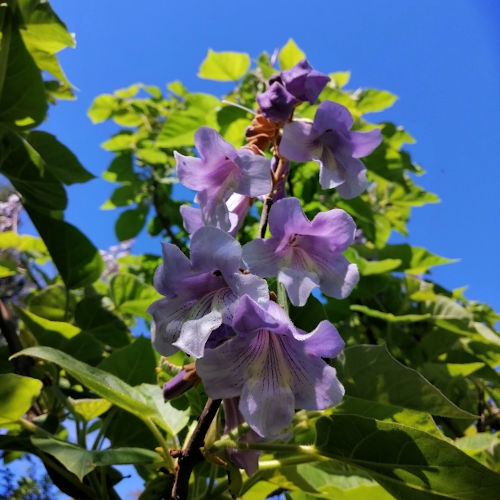Paulownia tomentosa
The Paulownia tomentosa, commonly known as the princess tree or empress tree, is a fast-growing deciduous species native to China. It is well-known for its large, heart-shaped leaves, fragrant lavender flowers, and its rapid growth rate.
Physical Characteristics
- Height: Can grow up to 15–20 meters.
- Trunk Diameter: Typically 30–60 cm but can grow larger in optimal conditions.
- Leaves: Large (up to 30 cm wide), ovate, and densely pubescent on the underside.
- Flowers: Bell-shaped, purple-lavender blooms appear in spring, often before the leaves.
- Seeds: Small, winged seeds contained in woody capsules.
Uses and Benefits
-
Timber:
Paulownia wood is lightweight, warp-resistant, and strong, making it ideal for furniture, musical instruments, and plywood. -
Erosion Control:
Its deep, fibrous root system stabilizes soil on slopes and prevents erosion. -
Carbon Sequestration:
The tree absorbs significant amounts of CO₂ due to its rapid growth, contributing to climate change mitigation. -
Ornamental Value:
The striking flowers and large leaves make it a popular choice for landscaping. -
Agroforestry:
It can be intercropped with other plants, providing shade and organic matter. -
Fodder:
Leaves can be used as livestock feed due to their high protein content. -
Medicinal:
In traditional Chinese medicine, parts of the tree are used to treat various ailments.
Propagation
Paulownia can be propagated through seeds, root cuttings, or tissue culture.
From Seeds:
- Seed Collection: Harvest mature seed pods in autumn (March-May in the Southern Hemisphere). Allow them to dry and extract seeds.
- Preparation:
- Use well-draining seed trays filled with a light, sandy mix.
- Sow seeds on the surface without covering them as they require light to germinate.
- Germination: Keep the soil moist and maintain temperatures of 20–25°C. Seeds usually germinate within 2–4 weeks.
- Transplanting: When seedlings are about 10 cm tall, transplant them to pots or a nursery bed.
From Root Cuttings:
- Collect Cuttings: During dormancy (winter: June-August in the Southern Hemisphere), take 10–15 cm long root segments, 1–2 cm in diameter.
- Planting: Bury the cuttings horizontally in sandy soil, covering them lightly.
- Watering: Keep the soil consistently moist. Sprouts should appear within 4–6 weeks.
Tissue Culture:
Used commercially for high uniformity and rapid propagation.
Cultivation
-
Climate:
- Thrives in warm-temperate to subtropical regions with 500–2000 mm annual rainfall.
- Frost-tolerant but grows best with a long, warm growing season.
-
Soil:
- Prefers well-drained, sandy loam with a pH of 5.5–7.5.
- Avoids waterlogged soils.
-
Planting:
- Space trees 3–5 meters apart.
- Plant during spring (September-November in the Southern Hemisphere) after frost risk has passed.
-
Watering:
- Requires consistent watering during the first year but becomes drought-tolerant once established.
-
Pruning:
- Prune lower branches during the first 2–3 years to promote straight trunk growth.
- Remove suckers regularly.
-
Fertilization:
- Apply nitrogen-rich fertilizer during the growing season for optimal growth.
- Incorporate organic matter to improve soil quality.
-
Pests/Diseases:
- Generally pest-resistant, though occasional issues with root rot or fungal diseases can occur in overly wet conditions.
Harvesting
- For timber, trees can be harvested within 7–10 years, depending on growth conditions.
- Leaves and flowers can be collected annually for other uses.
